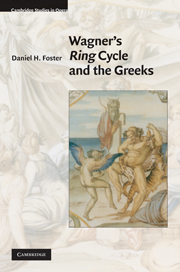Book contents
- Frontmatter
- Contents
- List of musical examples
- Preface
- Acknowledgments
- Introduction
- Part I Epic
- 1 Introduction: what is epic?
- 2 Retrospective narrative and the epic process
- 3 The orchestral narrator and elementary epic
- 4 Spiritual and factual realities in epic
- Part II Lyric
- Part III Drama
- Epilogue: Time, the Ring, and Performance Studies
- Appendices: Wagner's primary and secondary sources
- Notes
- Bibliography
- Index
1 - Introduction: what is epic?
from Part I - Epic
Published online by Cambridge University Press: 07 May 2010
- Frontmatter
- Contents
- List of musical examples
- Preface
- Acknowledgments
- Introduction
- Part I Epic
- 1 Introduction: what is epic?
- 2 Retrospective narrative and the epic process
- 3 The orchestral narrator and elementary epic
- 4 Spiritual and factual realities in epic
- Part II Lyric
- Part III Drama
- Epilogue: Time, the Ring, and Performance Studies
- Appendices: Wagner's primary and secondary sources
- Notes
- Bibliography
- Index
Summary
Of the three genres into which this book is divided, epic is possibly the most difficult to define. Perhaps more than drama and certainly more than lyric, the meaning of the word “epic” has been continually loosened by everyday speech, especially the kind of hyperbolic speech that tends to surround the film, television, and publishing industries. Every time we use epic to describe a summer blockbuster; every time we apply it to the latest mini-series; every time a story beyond two hundred pages turns out to be epic, it becomes that much harder to narrow our notion of this genre down to something more intellectually specific. It is not necessarily the case that these popular idioms do not deserve the epithet epic; genres do grow and change. But it seems we have all but forgotten that this term is something more than just a synonym for “really big.” Beyond the grander notions of its heroes and its length, we have conveniently forgotten epic's less splendid characteristics: its wordy lists, meandering plots, and attention not just to the great things in life but also the small – minute descriptions of basics like food preparation, clothing, and other domestic affairs. This is not only an aesthetic observation. Epics like the Odyssey and the Bible were/are not merely entertaining narratives about a certain group of characters, but cultural and religious guides for their readers and listeners.
- Type
- Chapter
- Information
- Wagner's Ring Cycle and the Greeks , pp. 33 - 44Publisher: Cambridge University PressPrint publication year: 2010



